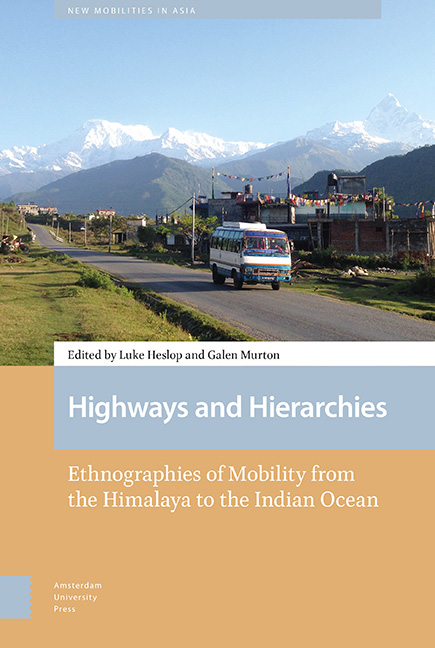Book contents
- Frontmatter
- Contents
- List of figures
- Acknowledgements
- Preface: Thinking with roads
- 1 Why highways remake hierarchies
- 2 Stuck on the side of the road: Mobility, marginality, and neoliberal governmentality in Nepal
- 3 A road to the ‘hidden place’: Road building and state formation in Medog, Tibet
- 4 Dhabas, highways, and exclusion
- 5 The edge of Kaladan: A ‘spectacular’ road through ‘nowhere’ on the India-Myanmar borderlands
- 6 The making of a ‘new Dubai’: Infrastructural rhetoric and development in Pakistan
- 7 Encountering Chinese development in the Maldives: Gifts, hospitality, and rumours
- 8 Roads and the politics of thought: Climate in India, democracy in Nepal
- Authors notes
- Index
8 - Roads and the politics of thought: Climate in India, democracy in Nepal
Published online by Cambridge University Press: 13 November 2021
- Frontmatter
- Contents
- List of figures
- Acknowledgements
- Preface: Thinking with roads
- 1 Why highways remake hierarchies
- 2 Stuck on the side of the road: Mobility, marginality, and neoliberal governmentality in Nepal
- 3 A road to the ‘hidden place’: Road building and state formation in Medog, Tibet
- 4 Dhabas, highways, and exclusion
- 5 The edge of Kaladan: A ‘spectacular’ road through ‘nowhere’ on the India-Myanmar borderlands
- 6 The making of a ‘new Dubai’: Infrastructural rhetoric and development in Pakistan
- 7 Encountering Chinese development in the Maldives: Gifts, hospitality, and rumours
- 8 Roads and the politics of thought: Climate in India, democracy in Nepal
- Authors notes
- Index
Summary
Abstract
The chapter presents the politics of thought as an analytical terrain through which to broach the themes at the heart of this volume: the inadvertent role of roads in reproducing and generating hierarchy, class inequality, and social disruption. In bringing together two major research projects led by the authors, we illustrate how roads have been engaged through critical social sciences as an epistemological as well as a material vector of change. By outlining methodological and conceptual approaches to large road and infrastructure projects in South Asia, we show how ideas build roads. The chapter draws attention to frequently overlooked aspects of road construction – such as how future environmental impacts are routinely ignored in the political processes and construction practices that constitute the making of roads.
Keywords: India, Nepal, Reunion, democracy, environment, methodology
Introduction
This chapter brings together two major research projects led respectively by Edward Simpson and Katharine Rankin: ‘Roads and the Politics of Thought: Ethnographic Approaches to Infrastructure Development in South Asia’and ‘Infrastructures of Democracy: State Building as Everyday Practice in Nepal's Agrarian Districts’. Simpson is an anthropologist, whose UKbased collaborative project worked comparatively across South Asia, but the contribution here is written with India centrally in mind. Rankin is a geographer trained in anthropology and planning, whose project works in partnership with Nepal- and Canada-based researchers and collaborators to explore road development in vernacular terms.
We start by considering how roads have been engaged through critical social sciences as a key vector of change, epistemological as much as material, before moving to discuss the key theoretical and practical aims of the research projects. The projects are centrally concerned with the overarching themes of this volume, namely the inadvertent role of roads in reproducing and generating hierarchy, class inequality, and social disruption; uneven experiences of road development amongst the people in its midst; and the articulation of road building with state building and sociopolitical and geopolitical relations. The projects consolidate around the politics of thought as an analytical terrain through which to broach these themes.
- Type
- Chapter
- Information
- Highways and HierarchiesEthnographies of Mobility from the Himalaya to the Indian Ocean, pp. 197 - 220Publisher: Amsterdam University PressPrint publication year: 2021

